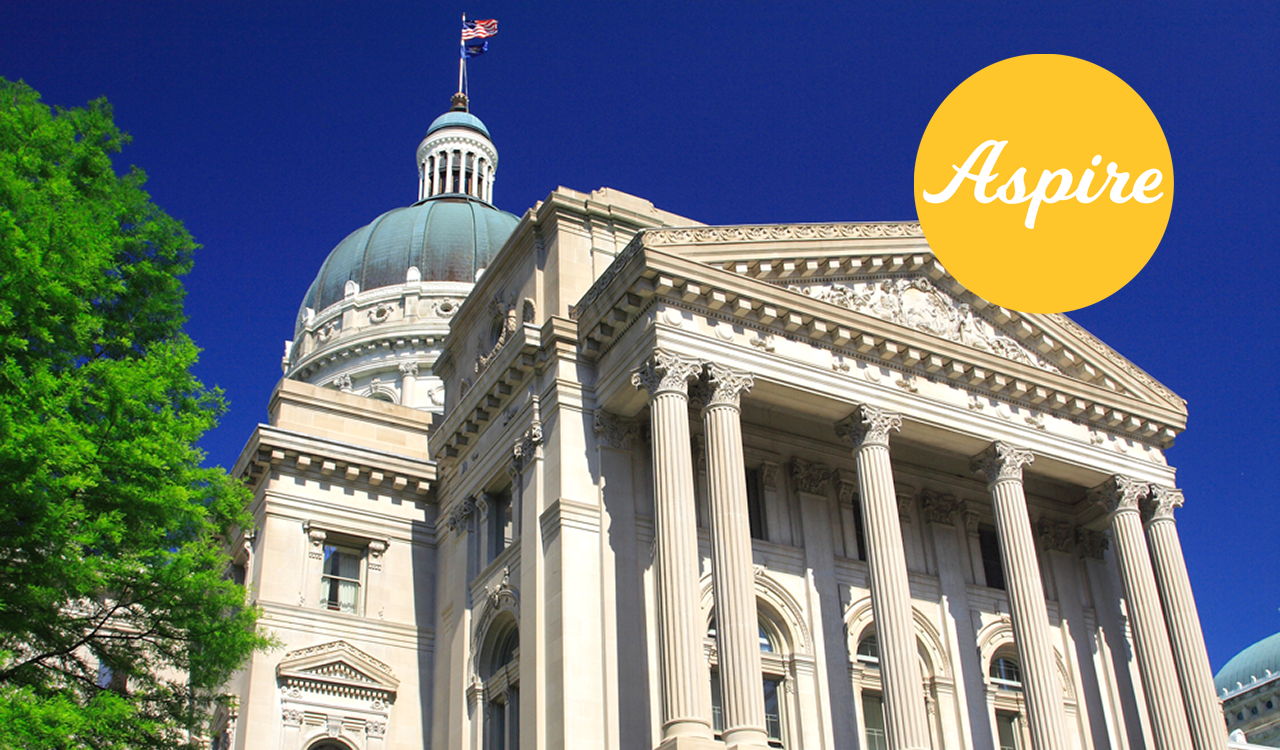Statehouse Update: A Good Place

The final days of the 2022 Indiana General Assembly session are upon us. Last week was the deadline for bills to be heard on the floor. The session is scheduled to conclude March 14, but we believe session might conclude early this week. So where are we? Considering the priority bills and issues Aspire has been tracking, we feel we are in a good place.
Bills that were amended are sent back to their originating chamber for concurrence (acceptance) or dissent. In a move late Wednesday evening, a dissent motion for HB 1001 was pulled and a concurrence motion filed instead. The concurrence vote was held Thursday with only a handful of dissenting votes. Hours after the bill passed, Gov. Eric Holcomb signed the bill into law and officially ended the state’s pandemic emergency declaration with an executive order Friday evening.
The final draft of HB 1001 not only allowed for the statewide health emergency to end without losing federal COVID-relief dollars, but also set reasonable parameters around employer vaccine mandates and reasonable accommodations for medical and religious exemptions (consistent with current federal guidelines). The final bill also excludes the old House language that would have weaponized the state’s unemployment system to punish employers for terminating employees not adhering to company policy.
It is important to note this new legislation applies to businesses of ALL SIZES, including small businesses. There are exemptions for federal contractors, health care facilities and interns. This means businesses not exempted from this law may require vaccinations as a condition of employment if they feel that is best for the safety of their clients and employees, but must allow for medical and religious exemptions, and provide a weekly covid testing option in lieu of vaccination (employers may require the testing costs to be at the employee’s expense).
As we reported last week, the Senate changes to HB 1001 were incredibly good for employers and reflect what Aspire and other business groups have been working towards since last fall when the bill’s irregular, outside-of-session hearings began in the House.
Anti-Transit Legislation: Mostly Dead All Day
And speaking of issues we have been tracking since last fall (about ten falls ago), as of this article’s writing, anti-transit amendments have remained out of moving bills and conference committee negotiations. We reported last week that late attempts to amend education bills to constrict transit development and operations failed. But we have learned to never say never and always remain skeptical. So, we continue to keep a close eye on this until session adjourns.
Still Alive! Affordable Housing Tax Credit
We are also keeping a close eye on an amendment we are excited to see make it across the finish line. The Indiana Department of Revenue various tax matters legislation SB 382 was amended in conference committee last week to include the Senate passed version of SB 262, workforce housing tax credit!
This bill creates a state tax credit against state tax liability for companies or shareholders who develop affordable and workforce housing. This is helpful because it layers over the federal incentives, making development of affordable housing more profitable and attractive to builders. This will help Indiana leverage the federal 4% housing tax credits that go underutilized today because the amount of equity in a federal 4% credit cannot equal development, labor, and material costs. If this language survives in SB 382, it will help make it easier for private developers to create the type of quality affordable housing our community needs.
Related, we are pleased that HB 1306, which creates a Statewide Housing Task Force, passed the Senate last week by a vote of 48-0 and the House concurred by a vote of 87-3. It is on its way to the Governor’s desk for signature. This task force is comprised of thirteen members, including representatives from the private sector, and will review housing data and consider measures that would encourage increased housing options. The task force is to issue a report by November 1, 2022.
What About Innovation Development Districts?
Our anxiety over Indiana’s new tax district created by SB 361 has been assuaged through amendments and conference committee negotiations. These large-scale “innovation districts” are not a new concept or tool – other states have successfully used them to win huge projects. We need Indiana to win similar game-changing deals and agree careful creation and use of new “super TIFs” might boost Indiana to the winner’s podium. The bill’s original language has been modified to better engage local community leadership and run it as a trial.
For instance, a board will be established to administer the district with three appointees representing the state and three representing the local unit (although we believe this may be stripped out in conference committee to simply require direct collaboration between the Indiana Economic Development Corporation and the local governments). The term of the district may not exceed 30 years, and the entire chapter of this proposed new Indiana code is scheduled to expired in 2025 and only 5 IDDs may be established. We also support the new language stipulating that 12% of property taxes shall remain in a fund for each city, town, county, or school corporation in the district. And it was also an important win for local communities that revenue raised in the district must now be used for projects in or around the vicinity for the benefit of the district.
Other major bills are not yet finalized, including the Governor’s push for tax cuts where the House and Senate are divided on the timing of cutting taxes. The House and Governor are pushing for immediate cuts while the Senate is taking a more measured approach. However, Senate President Pro Tem Bray announced at Aspire’s Legislation Matters luncheon last Friday that negotiation conversations are productive, signaling that there may be compromise coming.
Stay tuned next week for the exciting conclusion of the 2022 Indiana General Assembly session.
